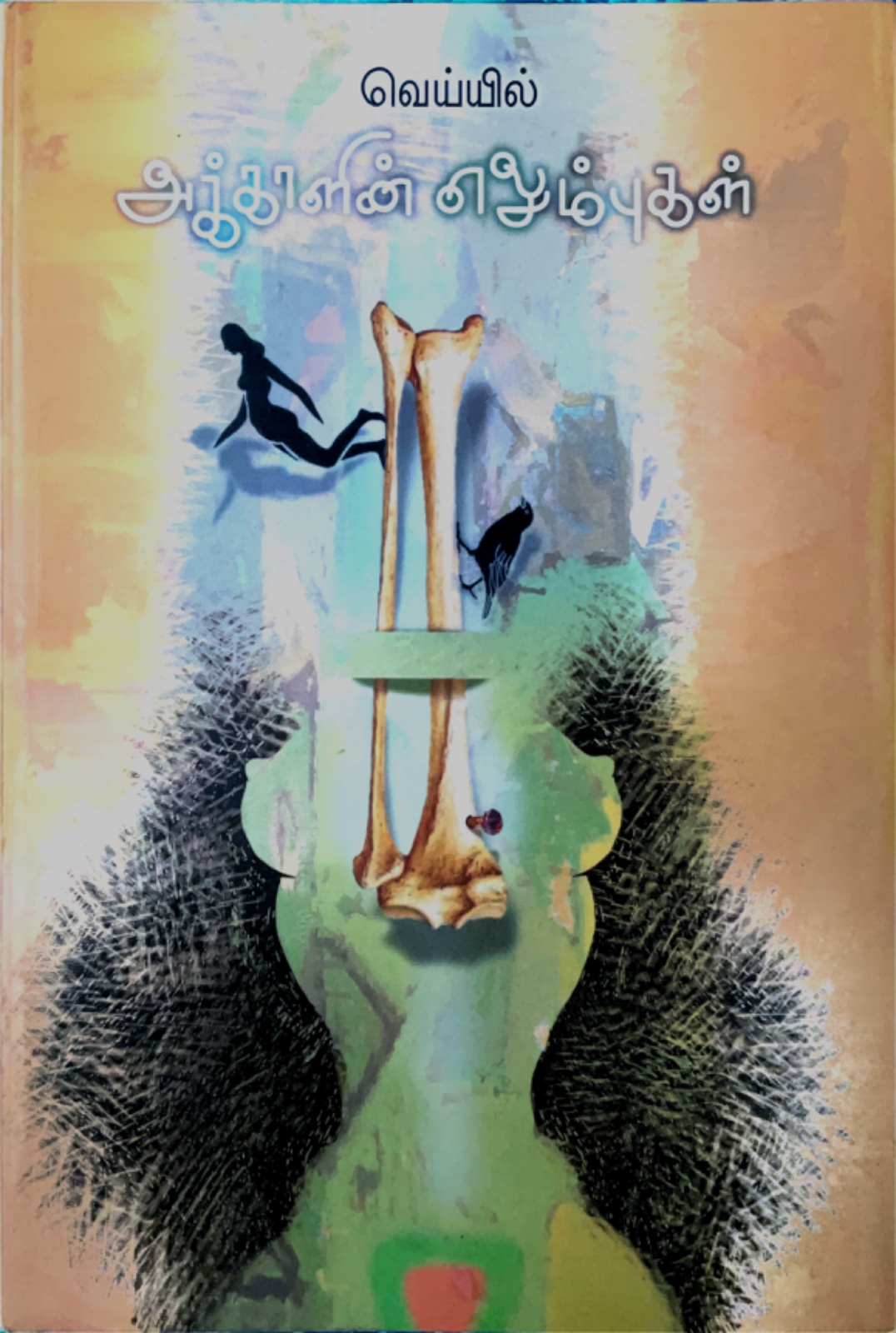REVIEWED BY SHERWIN RODRIGUEZ
Akkaalin Elumbugal, which roughly translates to “Sister’s Remains”, is a poignant and evocative collection of Tamil poetry by Veyyil, exploring the intricate and often painful world of women through the unique lens of a brother writing about his sister(s). While women are subjected to violence in many different situations for a variety of reasons, many of the poems in this collection deal with women, or rather sisters, who have been lost to honour killings. Each poem in this collection is a testament to Veyyil’s exceptional ability to capture the essence of human experience in compact, vignette-like forms, where entire worlds burst forth from the seemingly simplest of lines. This compactness of form and concomitant density of context can be seen clearly in the one of the earlier poems:
The palm planted for her marriage
has grown upto my shoulder
The one planted for her husband’s funeral
has grown upto my chest
Sister wants to fell one
And eat the heart of the palm.
From her stomach, she calls out
to the man in the distance
with a machete at his waist.
The framing device of a brother’s viewpoint is both innovative and deeply affecting, allowing Veyyil to delve into the intimate and often unspoken aspects of sibling relationships. This perspective adds a layer of complexity and irony, emphasizing the often invisible nature of women’s struggles within the familial and societal structure. The brother’s voice is not just a narrative tool but a conduit through which the reader experiences the depth of the sisters’ emotions, their silent suffering, and their defiant desires. Veyyil’s mastery over the Tamil language is evident throughout the collection, where his poems draw upon the immediate surroundings with an ease and familiarity that is both striking and immersive. The lush, vivid imagery, filled with Indian date palm trees and woodpeckers anchors the reader in the physical and emotional landscapes he creates. This wealth of environmental specificity, which brings to mind the thinai system of Sangam poetry, seamlessly blends with the themes explored in the poems, enhancing their emotional impact.
While Veyyil often draws his vocabulary from Sangam literature, the manner in which he strings his words together results in a poetic voice that carries an unmistakable resemblance to the Tamil spoken by the common folk of the arid heartland of Tamil Nadu. This blend of the ancient and the modern creates a sound that is both timeless and immediate, echoing the enduring nature of the themes Veyyil explores. One of the central themes of Akkaalin Elumbugal is the absurdity of violence directed at loved ones, and through the brother’s eyes, the reader witnesses the inexplicable and often senseless pain inflicted upon the sisters. This violence is not always physical; it is also emotional and psychological, manifesting in the restrictions and expectations placed upon women by their families and society. Nowhere else is this absurdity captured more clearly than in a poem which comes towards the end of the collection:
sister
was carried away by a crow
that’s all.
Veyyil does not shy away from depicting the harsh realities of this violence either, but he does so with a sensitivity that avoids sensationalism. For instance:
Though I’m a boy
I’m the youngest,
An immature child.
So, they gave me
The easiest task.
To close the eyes
Of my sister’s severed head
in the Babul grove.
Even then, they were surprised.
“How…how?” they asked.
I asked her to blink once;
She listened.
In addition to pain, the poems in Akkaalin Elumbugal also explore the desires of the sisters, ranging from the longing for freedom and self-expression to the more intimate and personal yearnings of the heart. These desires, portrayed with a nuanced understanding of their significance, are not mere whims but acts of everyday rebellion, small yet powerful assertions of individuality and agency.
These moments of love, desire and rebellion are interwoven with the mundane realities of life, creating a rich tapestry of experience that is both specific and universal. Veyyil’s ability to capture these fleeting yet profound moments is one of the collection’s greatest strengths, offering a glimpse into the inner lives of women that is rarely seen in literature.
The hen pecks at and eats
the centipedes in the front-yard.
With an eye on the door
and a song from the radio
on her lips,
she boils its eggs for someone.
Two thigh bones,
which have cracked
innumerable sugarcanes
for her, pedal home.
From a crack
in the eggs bouncing
in boiling water
albumen blooms.
This intertwining of the natural and the human creates a sense of continuity and interconnectedness that runs throughout the collection. It is a reminder that the struggles and desires of the sisters are not isolated events but part of a larger tapestry of life, where each thread is linked to the other in complex and often unseen ways. Akkaalin Elumbugal is a remarkable collection that offers a deeply moving exploration of the world of women through the innovative and empathetic lens of a brother’s perspective. Veyyil’s masterful use of language, vivid imagery, and profound themes create a work that is both timeless and timely, resonating with the reader on multiple levels. Through his portrayal of pain, desire, and the absurdity of violence, Veyyil not only sheds light on the experiences of women but also celebrates their resilience and strength.
Also, Read Two Tamil Poems III by Mounan Yathrika, Translated from The Tamil by Sherwin Rodriguez and published in The Antonym:
Follow The Antonym’s Facebook page and Instagram account for more content and exciting updates.



























0 Comments